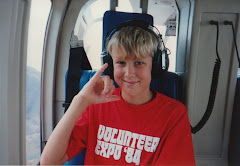 The collisions are usually wire strikes; a pilot is flying too low over unfamiliar terrain, perhaps following a river or attempting to land in an open field, and the helicopter strikes a power line or structural wire, ripping the aircraft from flight and sending it plummeting to the ground.
The collisions are usually wire strikes; a pilot is flying too low over unfamiliar terrain, perhaps following a river or attempting to land in an open field, and the helicopter strikes a power line or structural wire, ripping the aircraft from flight and sending it plummeting to the ground.Rotor stall is a condition in which, through pilot error, the rotor is allowed to slow down too much or the individual blades' angle against the air becomes too steep. As a result, the smooth airflow over the blades is disrupted, and the lifting force is lost.
In an attempt to recover lift, the pilot may reflexively increase the angle of the blades. This only worsens the condition; the wide surface of the blades against the air causes their rotation to rapidly decelerate to zero, and the helicopter falls from the sky like a stone.
On Wednesday, I suffered the emotional equivalent of rotor stall, and I decided to walk away from helicopters for good. (You may have noticed my last post was about seahorses.)
Over a few flights leading up to that point, communication between my instructor and me had rapidly deteriorated. He became increasingly critical of and impatient with my performance. In response, I became increasingly frustrated, resentful, and less inclined to heed his direction, which I expect only made him more impatient, and so on.
Our lessons were rife with negative, antagonistic vibrations. If you're learning how to play golf at the local pro shop, this dynamic can be frustrating. If you're learning how to fly helicopters, it's dangerous.
Perhaps you can remember a time when you had to execute a critical golf shot, tennis serve, basketball free throw, or a difficult sequence in music or dance. If so, you know that if you allow the mental tension to get into your muscles in these scenarios, it's over before you even try. Your muscles seize at precisely the wrong moment, and you choke.
Flying helicopters is equally physical, and the same dynamic applies, with the added pressure that a choke can be fatal.
Last Wednesday morning, I found myself flying a helicopter in a terrible feedback loop of tension. I was already angry and frustrated, and consequently tense. My instructor was barking instructions at me, making me more tense.
 Worst of all, I was aware that the tension in my arms and legs made me less capable of flying, which amplified my tension with fear, which effectively paralyzed me. My confidence in my ability decelerated to zero, and my emotional state collapsed.
Worst of all, I was aware that the tension in my arms and legs made me less capable of flying, which amplified my tension with fear, which effectively paralyzed me. My confidence in my ability decelerated to zero, and my emotional state collapsed.I ended the lesson early and walked away with barely a word to my instructor, convinced I was finished forever. I never want to feel that unbearable combination of anger and fear again, and I don't know that I'm willing to risk it by getting back in the cockpit.
All adventures, in fact all meaningful journeys of any kind, include crisis in which the adventurer faces overwhelming circumstances, and doubt threatens to plunge toward despair.
 The most successful adventure stories are those in which -- as the crisis reaches its climax -- we ourselves are swept into the uncertainty. We don't know whether David will defeat Goliath, whether the three hundred Spartan warriors can withstand a vast army of Persians, or whether Luke Skywalker, alone and under heavy fire, will be able to strike the Death Star's tiny weak point with a perfectly placed torpedo.
The most successful adventure stories are those in which -- as the crisis reaches its climax -- we ourselves are swept into the uncertainty. We don't know whether David will defeat Goliath, whether the three hundred Spartan warriors can withstand a vast army of Persians, or whether Luke Skywalker, alone and under heavy fire, will be able to strike the Death Star's tiny weak point with a perfectly placed torpedo.These stories grip us because each of us, in our own life's journey, is so familiar with crisis and its excruciating uncertainty. Sometimes, as with David and Luke Skywalker, we triumph. Sometimes, as with the Spartans, we do not.
I went to the airport today to sit down face to face with my instructor and discuss the situation. Now I must consider what was said.




1 comment:
It's been 12 years now, it's time for a follow-up story
Post a Comment